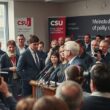The number of employees in the public sector in North Rhine-Westphalia has increased by 16 percent over the past ten years, reaching 890,000. In 2013, the state and municipalities had 120,000 fewer employees, according to an unpublished study by the Institute of the German Economy (IW), reported by the “Rheinische Post” in its Monday edition.
Two-fifths of the growth was due to the state, and three-fifths to the municipalities. Despite the significant increase in personnel, the union of civil servants and the union Verdi complain about a massive shortage of staff. The union of civil servants estimates a shortage of 570,000 positions in the public sector nationwide.
An examination of the development of personnel in the individual areas of responsibility shows an interesting result: the state of NRW has significantly increased its personnel in general and vocational schools, at universities, in the police and justice, and in the field of food, agriculture, and forestry.
However, over the past ten years, there was also a significant increase in the area of “political leadership, central administration, foreign affairs” of 34 percent or 4,800 positions, according to the IW.
While the growth in the public sector and in education is “broadly accepted” by society, the significant growth in the political leadership and central administration must be critically questioned. “It is likely that positions were created for political reasons” writes the Cologne institute.





